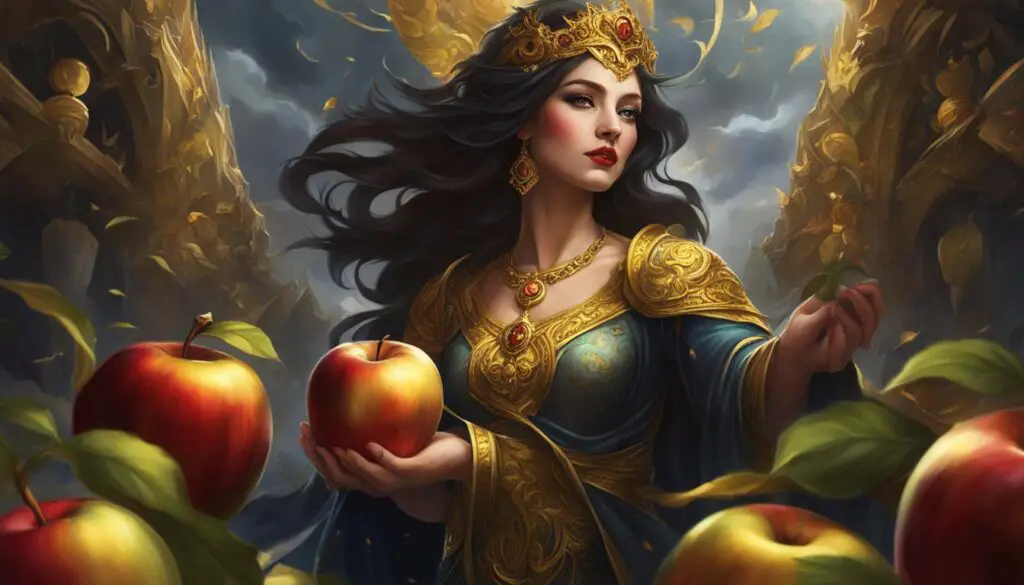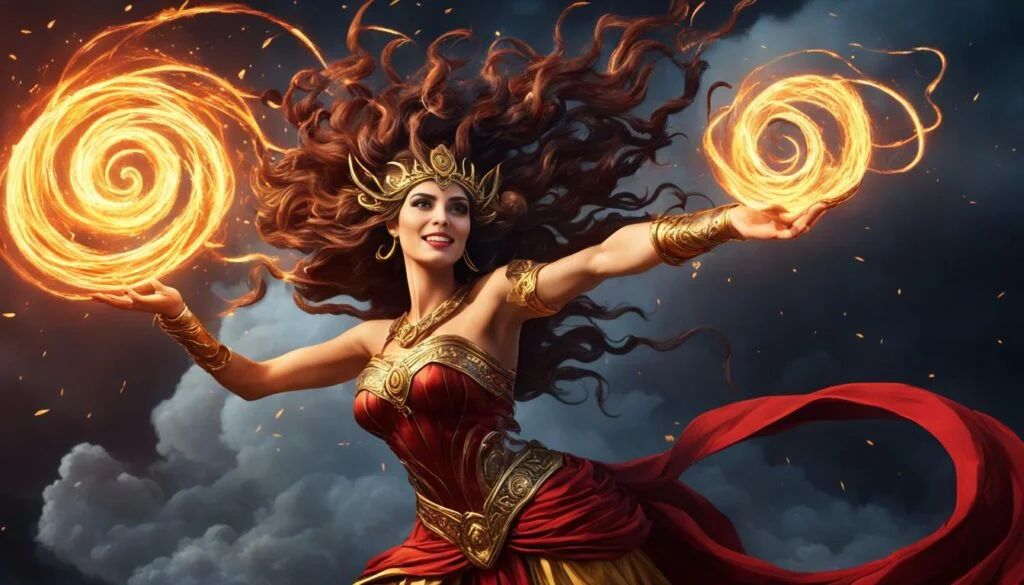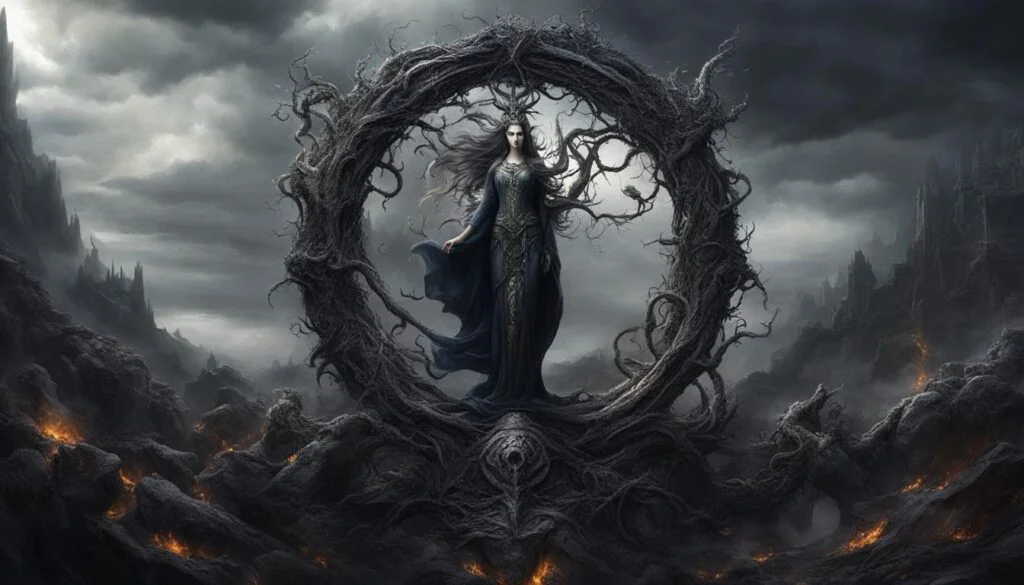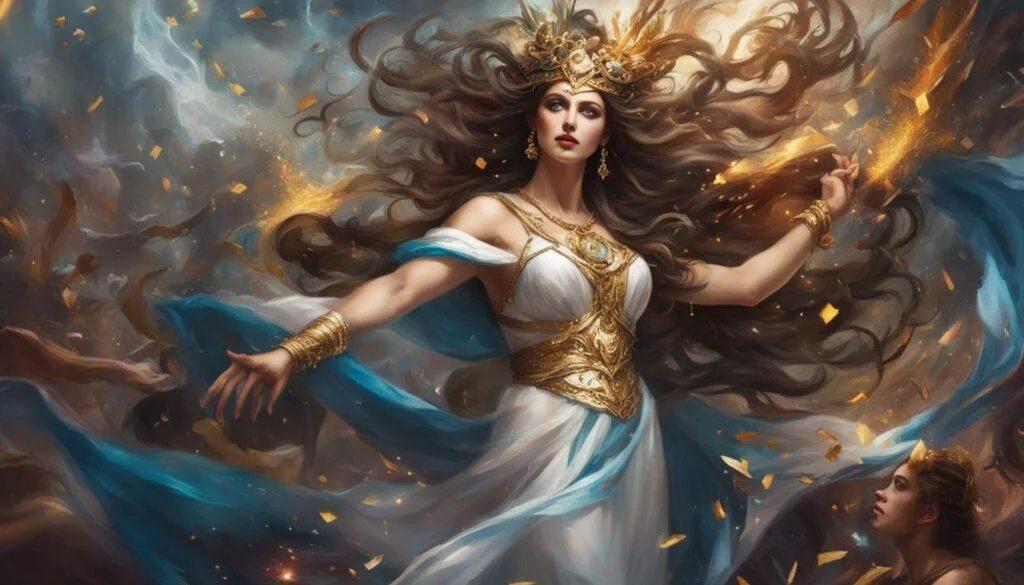Welcome to our exploration of Greek mythology’s fascinating and powerful deity, Eris. As the goddess of strife, discord, and chaos, Eris has a significant role in shaping the narratives of ancient Greek lore. Her actions and influence reach far and wide, impacting both gods and mortals alike.
Eris is renowned for her role in igniting the Trojan War, one of the most epic conflicts in Greek mythology. By throwing the golden apple of discord among the goddesses Hera, Athena, and Aphrodite, she set in motion a series of events that would shape the fate of nations.
From her origins to her connections with other deities and her destructive legacy, Eris’s story is captivating and full of complexity. Let us delve into the intriguing world of Greek mythology to uncover the mysteries surrounding this enigmatic goddess.
Key Takeaways:
- Eris is the Greek goddess of strife, discord, and chaos.
- She played a crucial role in the start of the Trojan War by causing a rivalry among the goddesses.
- Eris is associated with manipulation, inciting quarrels among gods and mortals.
- Her symbiotic relationship with Ares, the god of war, reinforces her ties to warfare and chaos.
- Eris’s influence extends beyond the gods, shaping the course of history and impacting human affairs.
The Origins of Eris in Greek Mythology
The origins of Eris in Greek mythology have varying accounts. Some sources claim she is the daughter of Night (Nyx), while others attribute her as the daughter of Zeus and Hera. Regardless of her parentage, Eris is universally recognized as the deity of strife and discord.
Her role in Greek mythology is often associated with war and chaos, and she is known for her mischievous nature in provoking quarrels and conflicts. Eris is a captivating figure with rich mythological stories that showcase her disruptive influence on gods and mortals alike.
- Eris is portrayed as the troublemaker who incited the Trojan War by throwing the golden apple of discord.
- She reveled in the chaos and destruction unleashed by battles and formed a symbiotic connection with Ares, the god of war.
- Eris’ ability to manipulate and sow discord among the gods and mortals left a lasting impact on Greek mythology.
Let’s dive deeper into the fascinating stories and symbolism surrounding Eris in Greek mythology.
Eris and the Golden Apple of Discord

One of the most notable acts of Eris in Greek mythology was her role in the story of the golden apple of discord. Eris cunningly inscribed the apple with the words “To the fairest” and threw it among the goddesses Hera, Athena, and Aphrodite. This act sparked a fierce competition among the goddesses, ultimately leading to the judgment of Paris and the events that triggered the Trojan War.
The golden apple incident symbolizes Eris’ ability to manipulate and sow discord among the gods and mortals. The chaos and conflict resulting from the goddesses’ rivalry demonstrate Eris’ disruptive nature and her power to influence the course of events. The story of the golden apple serves as a significant symbol in Eris mythology, representing the everlasting consequences of her actions and the inherent chaos that can arise when vanity and ego come into play.
Eris’ Manipulation and Discord
Eris, known as the goddess of strife and discord, masterfully exploited the goddesses’ desire for the golden apple, effectively pitting them against each other in a battle for supremacy. The rivalry that ensued showcased the depths of jealousy, betrayal, and divine manipulation.
Paris’ Decision and the Trojan War
Paris, a mortal, was tasked with the challenging decision of judging the fairest goddess among Hera, Athena, and Aphrodite. Caught in the middle of their fierce competition, Paris chose Aphrodite, who promised him the love of the most beautiful woman in the world, Helen of Sparta. This choice ignited the flames of war between Greece and Troy, leading to the decade-long Trojan War.
The story of the golden apple not only highlights Eris’ ability to sow discord but also showcases the profound impact her actions had on Greek mythology and history. It serves as a cautionary tale of the far-reaching consequences that arise from pride, envy, and the quest for power.
Eris and the Trojan War

Eris, the Greek goddess of chaos and discord, played a pivotal role in the infamous Trojan War. Her actions set off a chain of events that led to one of the most significant conflicts in Greek mythology.
It all began with the golden apple incident. Eris cunningly inscribed the apple with the words “To the fairest” and threw it among the goddesses Hera, Athena, and Aphrodite. This act of provocation ignited a fierce rivalry, as each goddess claimed the apple for herself, believing she was the fairest.
The dispute over the golden apple eventually reached a mortal named Paris, who was tasked with judging which goddess was the fairest. Each goddess used her powers of persuasion to sway Paris’s decision. In the end, Paris awarded the golden apple to Aphrodite, who had promised him the love of the most beautiful woman in the world.
This decision had dire consequences. The most beautiful woman in the world happened to be Helen, the wife of Menelaus, the king of Sparta. Her abduction by Paris sparked the wrath of the Greek kings and led to the assembly of the mighty Greek army, setting the stage for the Trojan War.
Eris’ manipulation and intervention in the golden apple incident exemplify her chaotic and disruptive nature. Through her actions, she not only incited strife among the gods but also impacted mortals, shaping the course of history. The war that ensued was filled with epic battles, heroic deeds, and tragic consequences, all directly linked to Eris’ initial act of discord.
As the goddess of chaos, Eris delighted in the chaos and destruction that ensued during the Trojan War. Her presence on the battlefield perpetuated the turmoil and amplified the conflicts between the Greeks and the Trojans. Eris reveled in the destruction, further fueling the relentless fighting between the two factions.
The Trojan War serves as a stark reminder of Eris’ influence and the devastating consequences that discord and strife can bring. It is a testament to the power and impact of mythological figures like Eris, whose actions shape the fate of gods and mortals alike.
Eris’ Relationship with Ares, the God of War
Eris, the Greek goddess of chaos, shares a unique connection with Ares, the god of war. As siblings and companions, they find joy in the havoc and devastation that ensue from battles and conflicts. Eris, with her mastery of discord, fuels the emotional and psychological turmoil that accompanies warfare. Meanwhile, Ares thrives on the physical aspect of combat, reveling in the bloodshed and destruction. Together, they personify the intertwining forces of strife and warfare that permeate Greek mythology.
On the battlefield, Eris’ presence perpetuates chaos and amplifies conflicts. As a disciple of Ares, she magnifies the tumultuous atmosphere, instilling fear and uncertainty in the hearts of warriors. Her influence on the outcome of battles cannot be underestimated, as she stokes the fires of aggression and fuels the unending thirst for victory.
It is in the partnership between Eris and Ares that we witness the embodiment of chaos and destruction. While Ares symbolizes the physicality of war, Eris represents the emotional and psychological toll it takes. Together, they form a formidable duo, painting a vivid picture of the gruesome realities of conflict and the everlasting struggle between order and chaos.
Eris’ Role in Inciting Quarrels and Conflicts

Eris, the Greek goddess of strife and discord, is notorious for her role in inciting quarrels and conflicts among both gods and mortals. She revels in the chaos and turmoil that accompany interpersonal and societal discord. By fueling jealousy, stoking resentments, and planting seeds of mistrust, Eris creates an atmosphere ripe for conflict, tearing through communities and nations.
Just as Eris exposes underlying tensions and rivalries among the gods, she also shakes the foundations of Mount Olympus. Her manipulations often lead to bitter rivalries and feuds among the divine beings, highlighting their own flaws and vulnerabilities.
In the mortal realm, Eris extends her influence to human affairs. She ignites conflicts and disrupts peaceful relationships, leaving a trail of animosity and strife in her wake. Like a master puppeteer, she pulls the strings of destiny, weaving a tapestry of discord and chaos.
The Seeds of Discord
- Eris thrives on fueling jealousy and envy among individuals, heightening their insecurities and driving wedges between them.
- Through subtle manipulation and cunning schemes, she stokes resentments and disagreements, amplifying minor disputes into full-blown conflicts.
- She plants seeds of mistrust, casting doubt and suspicion over once-peaceful alliances and friendships, tearing them apart.
Eris’ malevolent influence extends far beyond mere quarrels and disputes. She is an agent of chaos, disrupting harmony and peace wherever she goes. Her actions have far-reaching consequences, often leading to disastrous outcomes.
Eris’ role in inciting quarrels and conflicts serves as a cautionary tale, reminding us of the dangers of succumbing to division and strife. In Greek mythology, she exemplifies the destructive power of discord and the chaos it leaves in its wake. Whether through her mischief among the gods or her manipulations among mortals, Eris remains a formidable force, forever weaving the threads of animosity and discord throughout the realms.
Eris’ Offspring: Allegorical Beings and Evil Spirits

Eris, the goddess of chaos in Greek mythology, is believed to be the mother of various allegorical beings and evil spirits, each symbolizing the destructive consequences of discord and strife. These offspring serve as reminders of the perils and consequences that result from succumbing to Eris’ disruptive influence.
One such allegorical being is Toil, representing ceaseless labor and hardship. Toil serves as a constant reminder of the challenges and struggles that arise when harmony and unity are disrupted by discord.
Forgetfulness, another offspring of Eris, symbolizes the loss of memory and the erasure of past harmony. This allegorical being is a stark reminder of the consequences of forgetting the lessons learned from previous conflicts and the importance of maintaining peace.
Starvation personifies hunger and deprivation caused by fractured societies. This allegorical being serves as a powerful symbol of the devastating consequences that arise when discord tears communities apart, leading to the suffering and desperation experienced by those affected.
Pains, representing physical and emotional suffering, manifest as a result of Eris’ disruptive presence. This allegorical being highlights the immense pain and anguish that individuals endure when caught in the crossfire of strife and conflict.
These are just a few examples of Eris’ offspring, with many others embodying the various forms of devastation and suffering caused by chaos and discord. These allegorical beings not only demonstrate the far-reaching consequences of Eris’ influence but also serve as cautionary reminders of the importance of harmony and unity in society.
Eris in Modern Interpretations and Discordianism

Eris, the Greek goddess of chaos and strife, continues to intrigue and captivate through modern interpretations in literature and popular culture. Authors and artists delve into her mythology, exploring her complex nature and symbolisms that challenge established order and reveal hidden truths within society.
In works of dystopian fiction, Eris takes on a prominent role as she embodies disruptive forces that ignite revolutions and bring about societal transformations. Her presence in these narratives serves as a catalyst for change and underscores the power of chaos to dismantle existing structures.
Eris also maintains significance in the religion of Discordianism, which embraces the turbulent and unpredictable forces symbolized by the goddess. Discordianism celebrates chaos as a necessary element for growth and development, encouraging individuals to embrace change and uncertainty.
Conclusion
Eris, the Greek goddess of strife and discord, stands as a prominent figure in Greek mythology. Her infamous act of throwing the golden apple among the goddesses sparked the Trojan War, showcasing the destructive power of discord. Eris embodies the chaotic and disruptive forces that can wreak havoc on both individuals and societies. Through her role in inciting quarrels and conflicts among gods and mortals, she serves as a reminder of the ever-present struggle between order and chaos.
Eris’s presence in Greek mythology continues to captivate and intrigue. Her mischievous nature and ability to manipulate emotions and relationships reveal the darker side of human nature. The consequences of succumbing to Eris’s influence are evident in the allegorical beings and evil spirits that personify the destructive aftermath of discord. From ceaseless labor and deprivation to physical and emotional suffering, they serve as reminders of the perils of allowing strife to take hold.
Today, Eris remains a symbol of chaos and disruption. In modern interpretations, she features in literature, art, and even the religion of Discordianism, representing forces that challenge established order and expose hidden truths. Eris personifies the eternal struggle between order and chaos, reminding us of the complex nature of human relationships and the consequences of embracing strife. As we delve into the depths of Greek mythology, Eris stands as a formidable goddess, forever etched in the tapestry of ancient sagas.
FAQ
Who is Eris in Greek mythology?
Eris is the Greek goddess of strife and discord, known for her role in igniting the Trojan War.
What is Eris known for in Greek mythology?
Eris is known for her mischievous nature in provoking quarrels and conflicts among gods and mortals.
What is the story of the golden apple of discord?
Eris threw the golden apple among the goddesses Hera, Athena, and Aphrodite, sparking a fierce rivalry that led to the judgment of Paris and the Trojan War.
How did Eris contribute to the Trojan War?
Eris’ act of throwing the golden apple among the goddesses caused a rivalry that escalated into the judgment of Paris and triggered the Trojan War.
What is Eris’ relationship with Ares, the God of War?
Eris and Ares are siblings and companions, delighting in the chaos and destruction unleashed by battles.
How does Eris incite quarrels and conflicts?
Eris sows discord by fueling jealousy, stoking resentments, and planting seeds of mistrust, causing conflicts that tear through communities and nations.
What are Eris’ offspring and what do they represent?
Eris is believed to be the mother of allegorical beings and evil spirits such as Toil, Forgetfulness, Starvation, Pains, and many others, which symbolize the destructive consequences of discord and strife.
How does Eris inspire modern interpretations?
Eris continues to captivate authors and artists, representing a powerful force challenging established order and revealing hidden truths within society. She finds her place in dystopian fiction and the religion of Discordianism.
What is the significance of Eris in Greek mythology?
Eris is a prominent figure associated with chaos and the eternal struggle between order and chaos. Her role in inciting quarrels and conflicts serves as a reminder of the destructive power of discord.




